Greta Thunberg: Why are young climate activists facing so much hate?
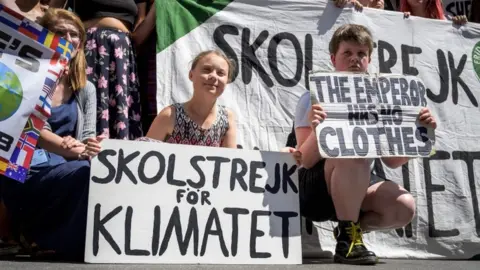 Getty Images
Getty ImagesFrom the first protest by a single student, the school climate strike movement has been a lightning rod for criticism.
Greta Thunberg, the Swedish teenager who inspired the now-global movement, has become a primary target. On Wednesday, the 16-year-old arrived in New York after completing her voyage across the Atlantic aboard an environmentally friendly yacht.
She faced a barrage of attacks on the way.
"Freak yachting accidents do happen in August," Arron Banks, a businessman and prominent Brexit campaigner, tweeted. While Mr Banks said the tweet was a joke, many were outraged.
Ms Thunberg is not the only eco-activist under fire, though. Four young climate campaigners told the BBC of the abuse they have been subjected to. One was compared to Nazi propaganda chief Joseph Goebbels while another said she had been racially abused.
These environmentalists have asked difficult questions of politicians, and been ruthlessly derided for doing so. With hostility heightening, why are young climate activists facing so much hate?

Since Ms Thunberg's first solo vigil outside Sweden's parliament in August 2018 media attention and criticism have gone hand-in-hand.
At first, they were told to stay in school. These students were not on strike, one British Conservative MP tweeted, they were truants.
Then there were claims that young climate activists were merely the puppets of adults. In February a far-right Dutch lawmaker said students were being influenced by teachers with a political agenda.
When Ms Thunberg travelled to the UK in April, several right-wing media outlets wrote polemics against the teen. One of them, an editorial by the website Spiked, mocked the "apocalyptic dread in her eyes".
There were sustained attacks by Germany's far-right Alternative für Deutschland (AfD) party ahead of the EU elections in May. Posts about Ms Thunberg and climate change spiked on the party's Facebook page, an investigation, led by Greenpeace Unearthed, found.
Weeks later, before her address to the French parliament in July, some far-right and conservative MPs hurled insults at the teen, calling her the "Justin Bieber of ecology" and a "prophetess in shorts".
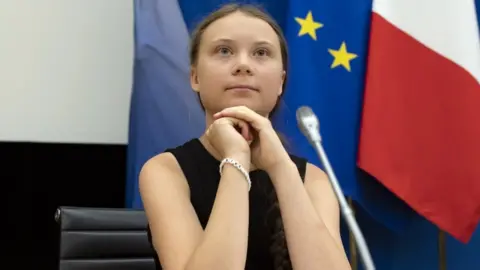 EPA
EPAThose who have resorted to personal attacks on the activist appear to be "retreating into various forms of denial", Nigel Thomas, professor of childhood and youth at the University of Lancashire, says.
Given the seriousness of scientists' climate warnings, some "may feel threatened by a teenager who has clearly understood and faced up to the trouble we are all in".
So far, she has shown restraint, staying mostly above the fray. Her tweeted response to Australian political blogger Andrew Bolt, who described her as "deeply disturbed", was an exception.
Allow X content?

Instead, Ms Thunberg tends to focus her ire on political leaders. Her brand of environmentalism, however, does not appeal to everyone.
In particular, those who "don't like being told what to do" and feel children "don't have the right to say these things", Richard Black, the director of the environmental think tank the Energy & Climate Intelligence Unit, said.
One theory is that, by using shaming tactics, some activists are provoking visceral reactions. But Mr Black said it is governments, not ordinary people, which she and others are targeting.
By couching her climate warnings in ominous terms, Greta's message has gained traction. Yet some have accused her of alarmism.
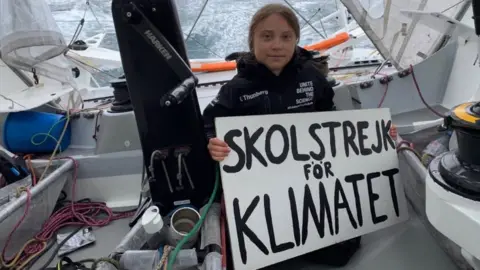 EPA
EPAProf Thomas disagrees with this assessment. He said her language "befits the very serious message she feels impelled to convey".
"I don't see how one can put climate change aside in assessing the appropriateness of her language; that's precisely the issue," he says.
Ms Thunberg has argued that climate activists are "just saying what scientists have repeatedly said for decades".
"I am just a messenger, and yet I get all this hate," she wrote on Facebook.
The reality is that the children who campaign, including school strikes, have become the bearers of bad news.
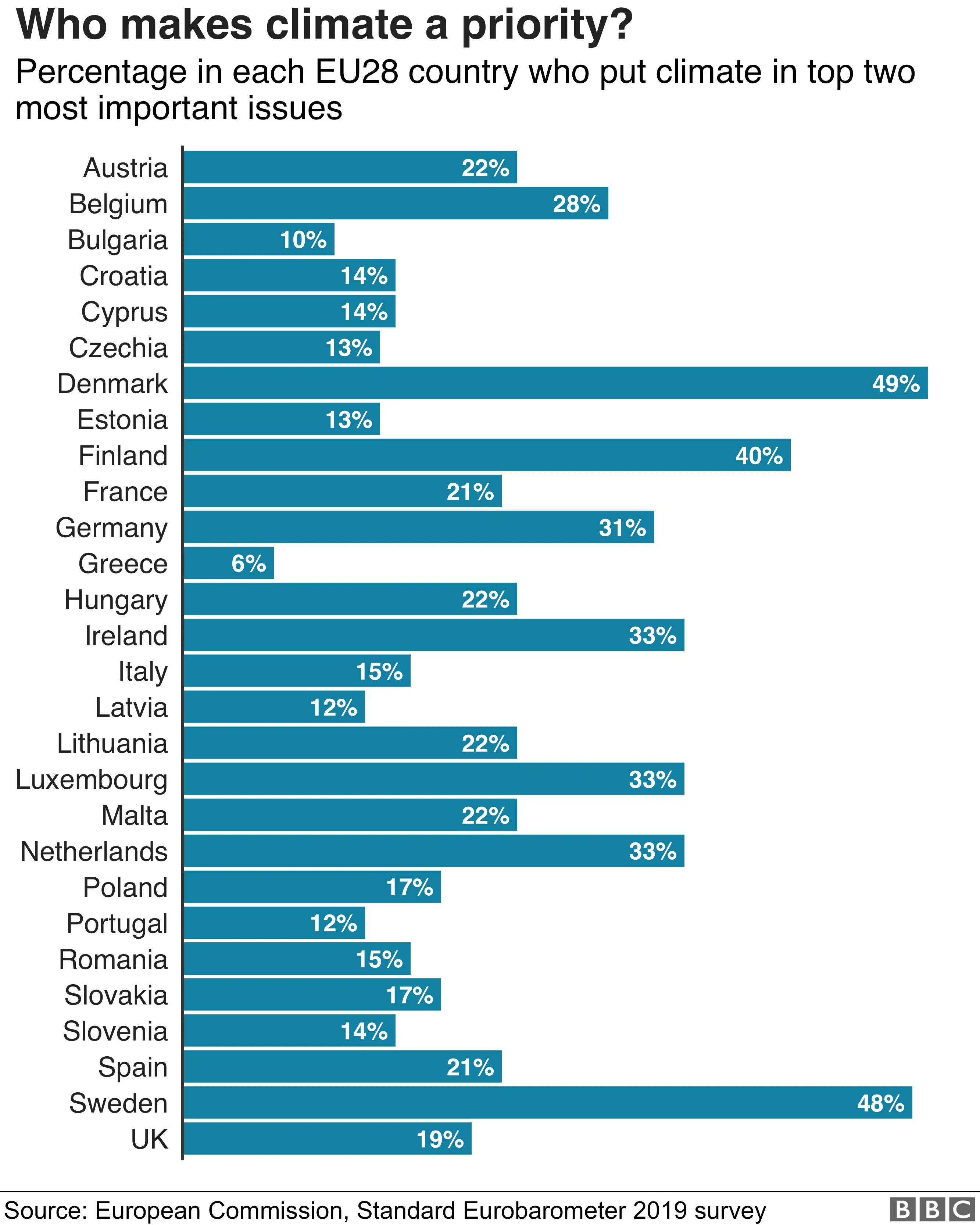

Global warming, according to the UN's Intergovernmental Panel on Climate Change (IPCC), is being caused by human activity. This conclusion is shared by 97% of actively publishing climate scientists, a 2016 study of peer-reviewed journals found. If carbon emissions are not curbed, and global temperatures continue to rise, researchers expect the risks of climate change to increase.
As purveyors of this scientific consensus, young climate activists are in the crosshairs of those who oppose radical action on it.
Dr Stephane Wolton, a London School of Economics professor whose research focuses on accountability, believes young activists should not be held to the same standards as adults.
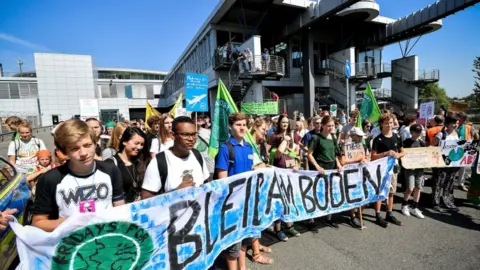 EPA
EPAHe says Ms Thunberg has to accept some scrutiny now she has put herself in the public eye "but we should not expect a 16-year-old, or even millions of them, to have solutions to such a complicated problem".
Although it is "fair game" to accuse her of "playing on emotions", personal attacks are not appropriate, he adds.
Michael Wyness, professor of education studies at the University of Warwick, says children are quite capable of accounting for their claims.
Many 16-year-olds would "probably not recognise themselves as children", Prof Wyness argues.
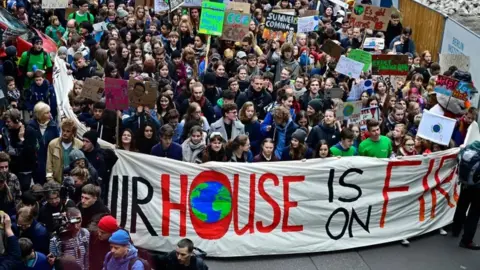 Getty Images
Getty ImagesRegardless of age, Prof Thomas says all activists should be held to account for their political interventions.
But he says this should be done "in a manner appropriate to their age and any other relevant characteristics".
Ms Thunberg has sought to position herself as an impartial messenger, saying "our school strike has nothing to do with party politics".
The problem is, her campaign "may be captured by other activists with a broader agenda", Dr Wolton says.
Sweeping changes to combat climate change will require increased state spending and intervention, an economic approach largely favoured by the left.
"I do think there are certain groups of campaigners, I would say a minority, whose main concern is changing the economic system," Mr Black, a former BBC environment correspondent, says.
This creates a dilemma for young activists professing their neutrality.
For the time being, three of the four young activists the BBC spoke to said they were not interested in politics. None of them intends to change the way they campaign and see politics, and the criticism that flows from it, as a distraction.
Aside from climate change, these youngsters have other interests, of course. For example, one said she's happiest when watching Netflix or playing with her dog.
Without the placards and slogans, it is easy to forget that many activists are, after all, children. But children doing what they believe to be right in what can be a cruel world.
